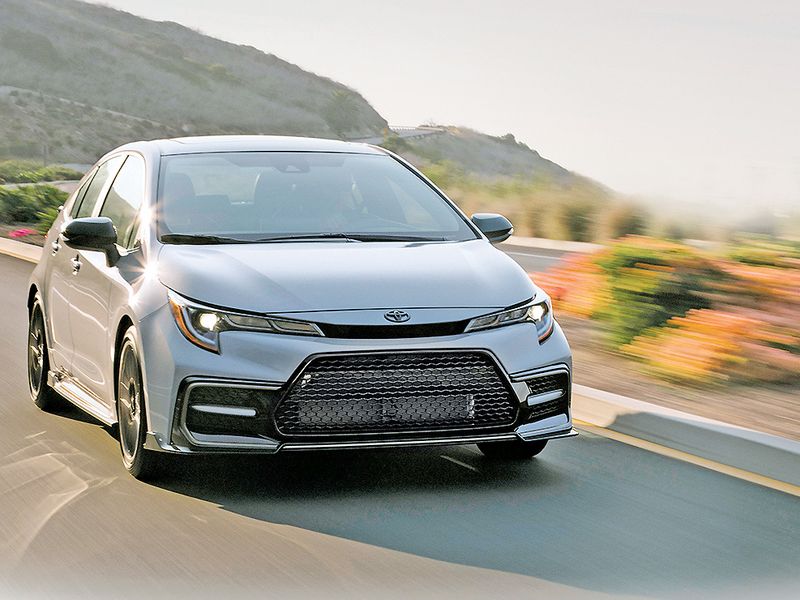
Toyota and Lexus dealers have found a way to resurrect sedan sales after their long decline, at least for now.
While U.S. light-vehicle sales pulled back in the third quarter across almost every segment, sales of cars — everything that’s not a ubiquitous crossover, SUV, van or pickup — were still up this year through September for the first time since 2013, rising 8.2 percent.
Among the factors impacting the car landscape this year are limited vehicle options on lots resulting from the microchip shortage and less competition in the car segment as some automakers such as General Motors and Ford Motor Co. significantly pared their car portfolios to concentrate on higher-profit light trucks.
Defending the honor of the car have been the automakers that have stayed committed to the former sales stalwart, including Toyota Motor North America.
Sales of the compact Toyota Corolla sedan were up 9.9 percent in the third quarter to 62,196 and 31 percent through September to 217,727, placing it just ahead of its longtime segment rival Honda Civic, which was up 7.8 percent to 216,575 sales.
In the once-dominant midsize segment, Toyota Camry sales stayed flat at 79,098 in the third quarter but have risen 25 percent this year to 256,769, opening up a wide lead on the second-place Honda Accord, whose sales are up 8.7 percent for the year to 157,988.
In the third quarter, alternative-power models and exotics were the only car segments that gained, while all other segments fell. Sales of midsize sedans are down 4.5 percent so far this year thanks to the selldown of discontinued nameplates, including the Ford Fusion, while the tiny minicar segment is down because of the disappearance of the Fiat 500.
Through September, however, every other car segment is up year over year by as much as 27 percent, according to the Automotive News Research & Data Center.
“Those were the only things that were there because those were the things that were not picked earlier,” said Tyson Jominy, vice president of data and analytics at J.D. Power. “If you go to the dealership and you want an SUV, but there were no SUVs, but there are cars, that’s what you drove home with.”
After a quick start earlier, most car sales have slowed as the year has progressed, especially as the chip crisis tightened and automakers that stayed in the segments began to steer their remaining chips to some lines and exclude others, as has been the case with the Chevrolet Malibu and Volkswagen Jetta.
Passenger cars “have remained a high part of our sales mix,” said Doug Eroh, general manager of Longo Toyota, the brand’s largest U.S. dealership, located in the Los Angeles suburb of El Monte, Calif.
He said passenger-car sales at Longo are now 47 percent of his overall business, up from 45 percent in 2019 — far higher than most other parts of the country.
“I attribute that to the fact that consumers in California are still making long commutes and need a safe, reliable, high fuel economy vehicle for these commutes and are still opting for a car,” Eroh said, adding that some of those sales were made possible by a better supply earlier in the year.
“There are still people who want sedans,” said Stephanie Brinley, senior analyst at IHS Automotive. “It’s pretty simple; that segment of the market isn’t growing, but it’s not zero. It’s not entirely unlike what happened to minivans awhile ago, when they tanked, but for those automakers who stayed in the segment and could compete profitably, they gained.”
Toyota — which has discontinued the Yaris and Avalon in the U.S. — still sees value in the car segments. Executives with the Japanese automaker say they are happy to sweep up any car sales that its competitors no longer want.
“Subcompact and midsize cars offer a certain level of value, affordability and fuel efficiency that SUVs and trucks do not,” said Bob Carter, head of sales at Toyota Motor North America. “With the sharp reduction of competitive models, sedans continue to represent an important opportunity for us to keep building Toyota’s owner base.”
John Luciano, general manager of Street Volkswagen of Amarillo, part of Street Automotive Group in Texas, which also operates Street Toyota, said the sedan sales he sees are largely “payment buyers” and people who think crossovers are just a little too big for comfort.
“It’s people who need a vehicle back and forth, to and from, and those cars are still crazy affordable for what you get, and they are still a good value,” Luciano said. “But we don’t see a lot of repeat sedan purchases.”
Jominy said cars have continued to lose market share to light trucks, especially as automakers have discontinued car nameplates to focus production on more profitable and popular light trucks.
“They’ve discontinued so many subcompact, compact and midsize cars that, as sales increase and we sell out of those, there’s nothing to replace them with,” Jominy said. “All the vehicles that are being discontinued puts [those shoppers] at play, and once they’re at play, they either leave the segment or even the automaker.”

